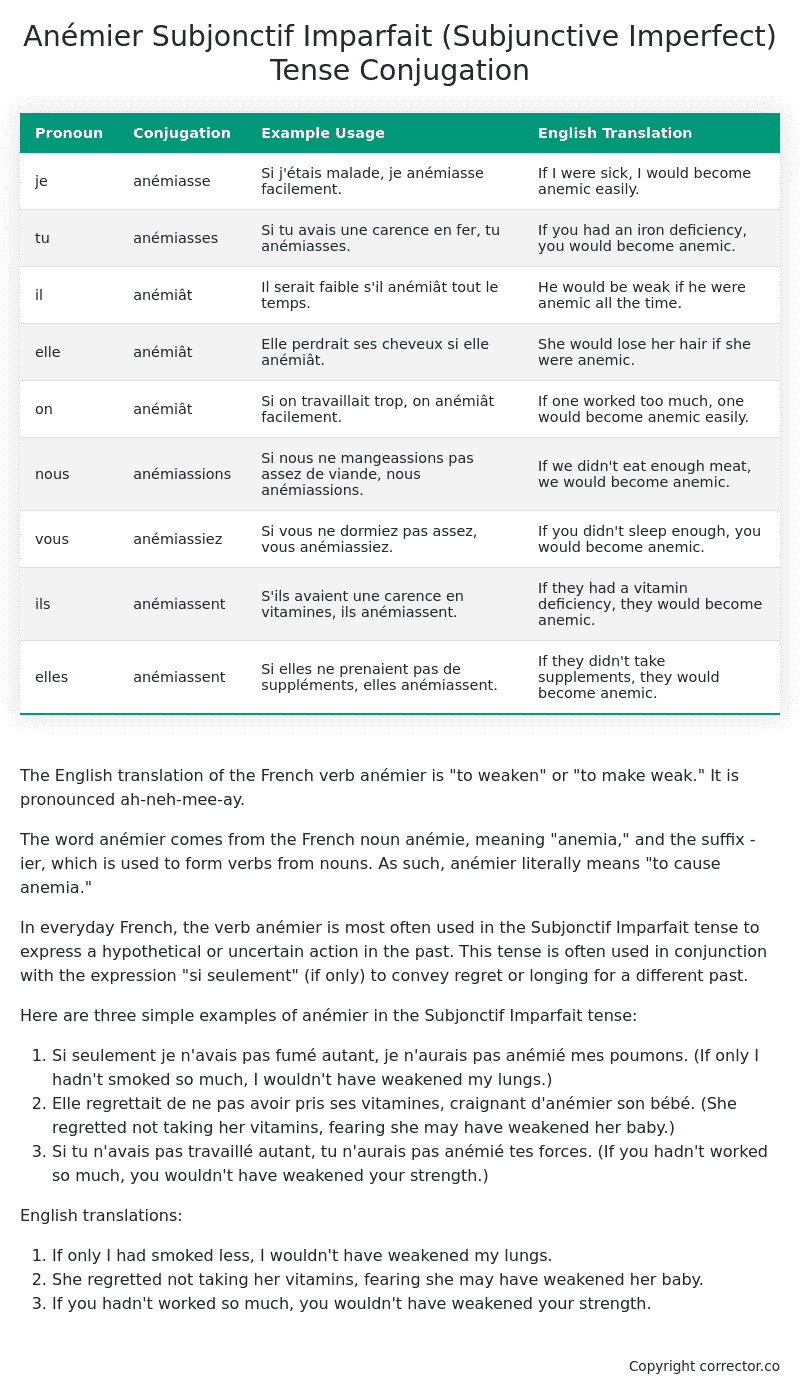Subjonctif Imparfait (Subjunctive Imperfect) Tense Conjugation of the French Verb anémier
Introduction to the verb anémier
The English translation of the French verb anémier is “to weaken” or “to make weak.” It is pronounced ah-neh-mee-ay.
The word anémier comes from the French noun anémie, meaning “anemia,” and the suffix -ier, which is used to form verbs from nouns. As such, anémier literally means “to cause anemia.”
In everyday French, the verb anémier is most often used in the Subjonctif Imparfait tense to express a hypothetical or uncertain action in the past. This tense is often used in conjunction with the expression “si seulement” (if only) to convey regret or longing for a different past.
Here are three simple examples of anémier in the Subjonctif Imparfait tense:
- Si seulement je n’avais pas fumé autant, je n’aurais pas anémié mes poumons. (If only I hadn’t smoked so much, I wouldn’t have weakened my lungs.)
- Elle regrettait de ne pas avoir pris ses vitamines, craignant d’anémier son bébé. (She regretted not taking her vitamins, fearing she may have weakened her baby.)
- Si tu n’avais pas travaillé autant, tu n’aurais pas anémié tes forces. (If you hadn’t worked so much, you wouldn’t have weakened your strength.)
English translations:
- If only I had smoked less, I wouldn’t have weakened my lungs.
- She regretted not taking her vitamins, fearing she may have weakened her baby.
- If you hadn’t worked so much, you wouldn’t have weakened your strength.
Table of the Subjonctif Imparfait (Subjunctive Imperfect) Tense Conjugation of anémier
| Pronoun | Conjugation | Example Usage | English Translation |
|---|---|---|---|
| je | anémiasse | Si j’étais malade, je anémiasse facilement. | If I were sick, I would become anemic easily. |
| tu | anémiasses | Si tu avais une carence en fer, tu anémiasses. | If you had an iron deficiency, you would become anemic. |
| il | anémiât | Il serait faible s’il anémiât tout le temps. | He would be weak if he were anemic all the time. |
| elle | anémiât | Elle perdrait ses cheveux si elle anémiât. | She would lose her hair if she were anemic. |
| on | anémiât | Si on travaillait trop, on anémiât facilement. | If one worked too much, one would become anemic easily. |
| nous | anémiassions | Si nous ne mangeassions pas assez de viande, nous anémiassions. | If we didn’t eat enough meat, we would become anemic. |
| vous | anémiassiez | Si vous ne dormiez pas assez, vous anémiassiez. | If you didn’t sleep enough, you would become anemic. |
| ils | anémiassent | S’ils avaient une carence en vitamines, ils anémiassent. | If they had a vitamin deficiency, they would become anemic. |
| elles | anémiassent | Si elles ne prenaient pas de suppléments, elles anémiassent. | If they didn’t take supplements, they would become anemic. |
Other Conjugations for Anémier.
Le Present (Present Tense) Conjugation of the French Verb anémier
Imparfait (Imperfect) Tense Conjugation of the French Verb anémier
Passé Simple (Simple Past) Tense Conjugation of the French Verb anémier
Passé Composé (Present Perfect) Tense Conjugation of the French Verb anémier
Futur Simple (Simple Future) Tense Conjugation of the French Verb anémier
Futur Proche (Near Future) Tense Conjugation of the French Verb anémier
Plus-que-parfait (Pluperfect) Tense Conjugation of the French Verb anémier
Passé Antérieur (Past Anterior) Tense Conjugation of the French Verb anémier
Futur Antérieur (Future Anterior) Tense Conjugation of the French Verb anémier
Subjonctif Présent (Subjunctive Present) Tense Conjugation of the French Verb anémier
Subjonctif Passé (Subjunctive Past) Tense Conjugation of the French Verb anémier
Subjonctif Imparfait (Subjunctive Imperfect) Tense Conjugation of the French Verb anémier (this article)
Subjonctif Plus-que-parfait (Subjunctive Pluperfect) Tense Conjugation of the French Verb anémier
Conditionnel Présent (Conditional Present) Tense Conjugation of the French Verb anémier
Conditionnel Passé (Conditional Past) Tense Conjugation of the French Verb anémier
L’impératif Présent (Imperative Present) Tense Conjugation of the French Verb anémier
L’infinitif Présent (Infinitive Present) Tense Conjugation of the French Verb anémier
Struggling with French verbs or the language in general? Why not use our free French Grammar Checker – no registration required!
Get a FREE Download Study Sheet of this Conjugation 🔥
Simply right click the image below, click “save image” and get your free reference for the anémier Subjonctif Imparfait tense conjugation!

Anémier – About the French Subjonctif Imparfait (Subjunctive Imperfect) Tense
Formation
Common Everyday Usage Patterns
Interactions with Other Tenses
Subjonctif Présent
Indicatif Passé Composé
Conditional
Conditional Perfect
Summary
I hope you enjoyed this article on the verb anémier. Still in a learning mood? Check out another TOTALLY random French verb conjugation!


